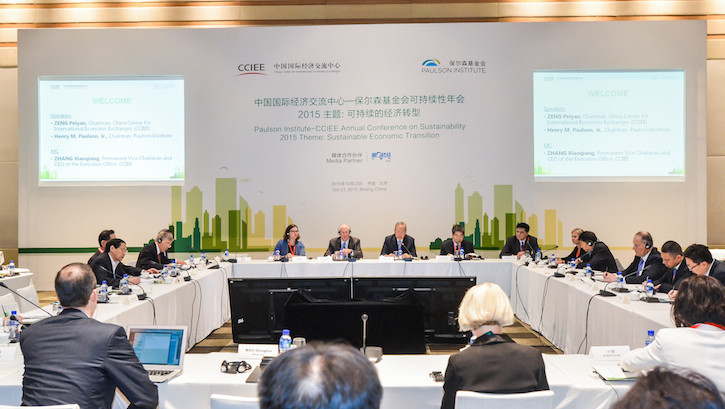
At their fifth Annual Conference on Sustainability, the Paulson Institute and the Chinese Center for International Economic Exchanges (CCIEE) convened more than 150 top Chinese and international business leaders, policy experts, mayors and policymakers to explore the barriers, opportunities and domestic and international best practices in economic and energy transition.
“When we think about air quality, climate and economic prosperity all working together—that is something that China not only can do, but where China can lead,” Kate Gordon, Paulson Institute Vice Chair of Climate and Sustainable Urbanization, said in her remarks. This sentiment is one of the central messages in China’s Next Opportunity: Sustainable Economic Transition and How Jing-Jin-Ji Can Lead the Way, the report the Institute launched at the conference. The report set the background for the day’s discussions.
“This year’s theme of “sustainable economic transition” is important because it captures two critical goals that China is pursuing today, which we expect will be included in the upcoming 13th Five Year Plan,” Paulson Institute Chairman Hank Paulson said in his opening remarks. “These goals are both environmental and economic: the first is to peak China’s carbon emissions and curb its air quality impacts. In tandem with the first, the second goal is to move toward a more diversified and sustainable economic model.”
The first panel of the day was comprised of Chinese and US CEOs discussing how low-carbon investment and solutions can drive commerce and foster a strong US-China commercial relationship. China Business News Deputy Editor in Chief Yang Yanqing moderated the panel, which included Dave Cote, Chairman and CEO, Honeywell; Gao Jifan, Chairman and CEO of Trina Solar; Li Jiping, Executive Vice-President, China Development Bank; Daniel Poneman, President and CEO, Centrus Energy; and Zhang Yue, Chairman and President, Broad Group.
The morning session also included a panel of local senior level municipal leaders from Jing-Jin-Ji including Beijing, Tianjin, Baoding, and Zhangjiakou, discussing challenges and opportunities to leading the region’s transition. In the afternoon, experts discussed innovative green finance, exploring policy options and impacts of setting a price for carbon, as well as ways to reform China’s energy system, integrate more renewable energy into the grid, and drive more energy efficiency in China’s building sector. There was also a panel discussion with representatives from the past three Paulson Institute and CCIEE Prize for Cities of the Future winning projects.
In closing, Paulson Institute’s Kate Gordon reflected on the inspiring energy and motivation seen among all of the conference participants: “Today we have seen a lot of leadership, drive and excitement here in the Jing-Jin-Ji region. There is a real opportunity here for this region to be a model and lead in these areas and show the rest of the world how this can be done.”





